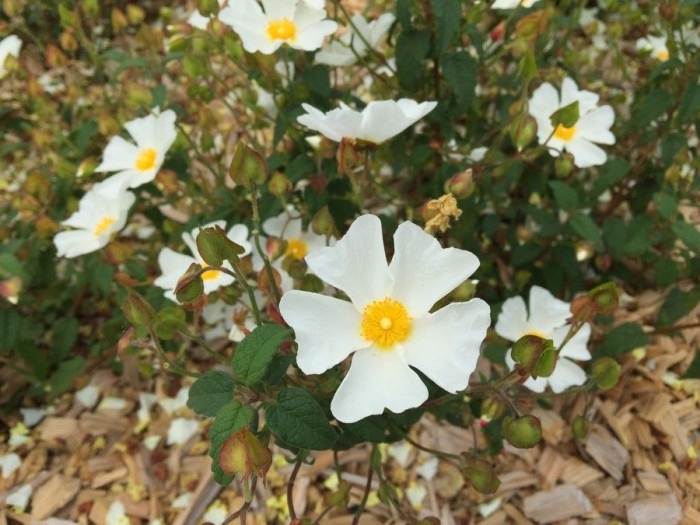Montpelier Cistus
(Cistus monspeliensis)
Montpelier Cistus (Cistus monspeliensis)
/
/

Zaldua Setién Marina
CC BY-SA 4.0
Image By:
Zaldua Setién Marina
Recorded By:
Copyright:
CC BY-SA 4.0
Copyright Notice:
Photo by: Zaldua Setién Marina | License Type: CC BY-SA 4.0 | License URL: https://creativecommons.org/licenses/by-sa/4.0/ | Attribution: Zaldua Setién Marina (cc-by-sa) | Rights Holder: Zaldua Setién Marina | Publisher: PlantNet | Date Created: 2019-05-05T16:37:17.882Z | Title: Cistus monspeliensis L.: flower | Notes: Cistus monspeliensis L.: flower |




















































Estimated Native Range
Summary
Cistus monspeliensis, commonly known as Montpelier Cistus, is an evergreen subshrub or shrub native to the Mediterranean region, particularly in dry, open areas such as maquis, garigue, and coastal scrublands. It typically grows to a height of around one meter and a width of 1.5 meters. The plant is characterized by its narrow evergreen leaves with a hairy, glandular, and sticky surface. The leaves are linear to lance-shaped, green, with a rugose, wrinkled upper surface, and can grow up to 5 centimeters long. Montpelier Cistus produces an inflorescence that is generally a panicle of 2 to 8 flowers, each with five sepals and five white petals, which bloom in late spring to early summer. The flowers are showy and attract pollinators.
Montpelier Cistus is valued for its drought tolerance and is often used in xeriscaping, rock gardens, and Mediterranean-themed landscapes. It is also appreciated for its aromatic foliage and the contrast between its white flowers and dark green leaves. This plant is well-suited for cultivation in full sun, requiring low amounts of water and thriving in soils with fast drainage. It is generally free of serious pests and diseases but can be susceptible to root rot in poorly drained soils. Montpelier Cistus is not known for aggressive roots or invasiveness, making it a suitable choice for a variety of garden settings.CC BY-SA 4.0
Montpelier Cistus is valued for its drought tolerance and is often used in xeriscaping, rock gardens, and Mediterranean-themed landscapes. It is also appreciated for its aromatic foliage and the contrast between its white flowers and dark green leaves. This plant is well-suited for cultivation in full sun, requiring low amounts of water and thriving in soils with fast drainage. It is generally free of serious pests and diseases but can be susceptible to root rot in poorly drained soils. Montpelier Cistus is not known for aggressive roots or invasiveness, making it a suitable choice for a variety of garden settings.CC BY-SA 4.0
Plant Description
- Plant Type: Subshrub, Shrub
- Height: 3-4 feet
- Width: 3-4 feet
- Growth Rate: Moderate
- Flower Color: White
- Flowering Season: Spring
- Leaf Retention: Evergreen
Growth Requirements
- Sun: Full Sun
- Water: Low
- Drainage: Fast
Common Uses
Bank Stabilization, Bee Garden, Bird Garden, Butterfly Garden, Drought Tolerant, Fragrant, Groundcover, Low Maintenance, Salt Tolerant, Showy Flowers, Street Planting
Natural Habitat
Dry, open areas such as maquis, garigue, and coastal scrublands in the Mediterranean region
Other Names
Common Names: Montpelier Rock-Rose, Montpellier-Zistrose, Smalbladig Cistros
Scientific Names: , Cistus monspeliensis, Cistus monspeliensis var. affinis, Cistus monspeliensis subsp. affinis, Cistus affinis, Cistus monspeliensis f. affinis,
GBIF Accepted Name: Cistus monspeliensis L.